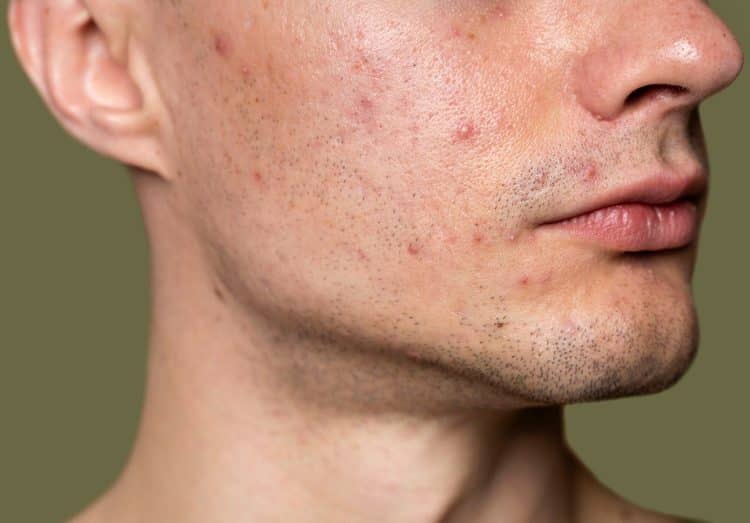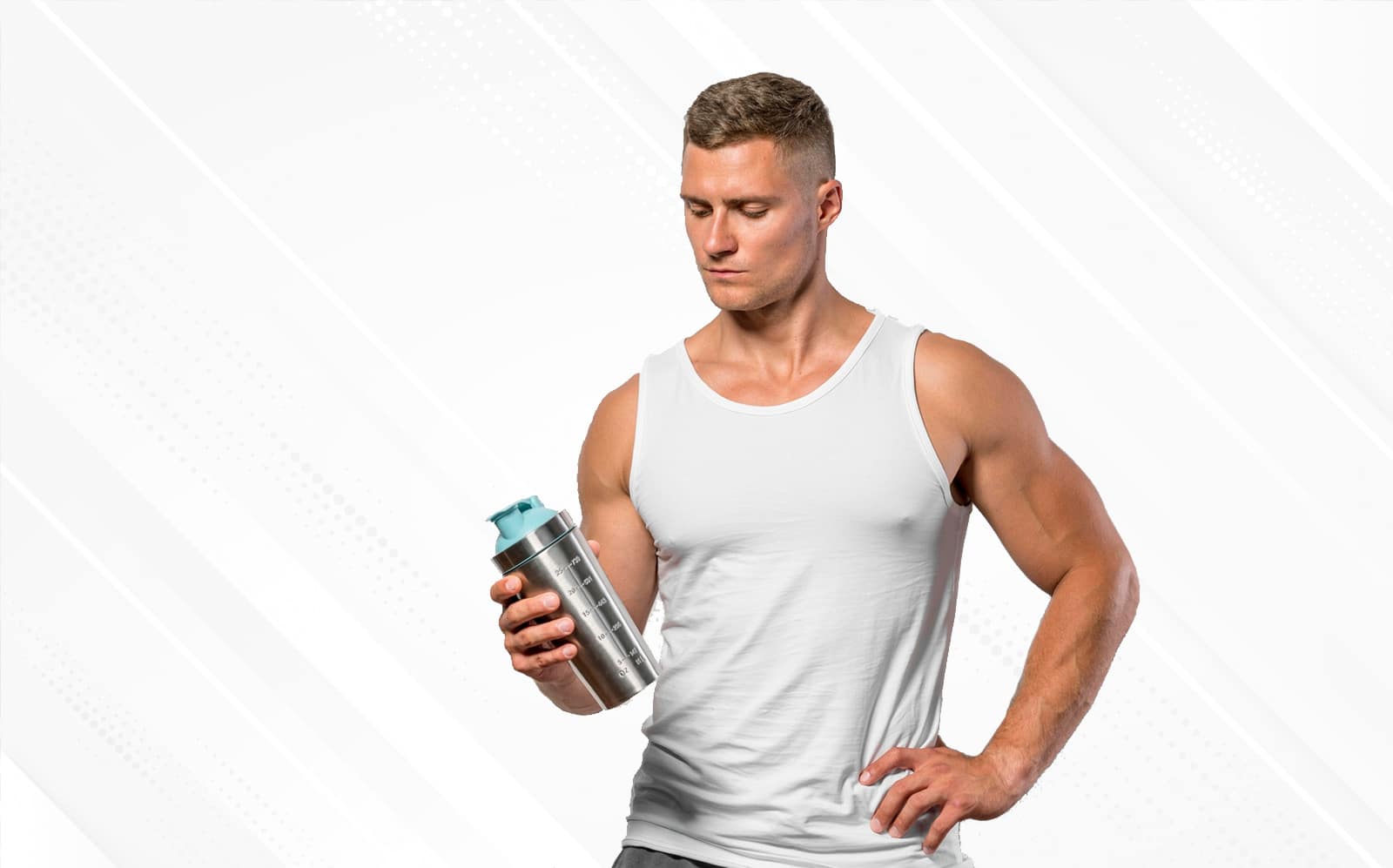Many people complain about creatine use causing excess weight gain, muscle cramps, problems with digestion, and liver and kidney issues.
White powders, especially microdozed ones, are notorious for drawing unwanted attention — If you know what I mean.
Creatine is one of the most popular (and researched) supplements in the sports nutrition industry.
Studies have shown that creatine can help build muscle mass and strength, boost exercise performance, endurance, and recovery, and improve cognitive function. [1][2][3]
I have been using creatine on and off since 2010, and I can tell you this — every time I start cycling creatine, my training performance and muscle and strength gains go through the roof. So, this article culminates over 50 years of research data and 20 years of use.
Although creatine is awesome, discussing its benefits is out of the scope of this article. I will limit this article to the creatine side effects, providing you with the necessary information to decide whether it’s a suitable addition to your supplement regimen.
If you need a detailed list of all the pros and cons of supplementing with creatine, I’ve written an in-depth, all-you-need-to-know article about it. You can check it out here.
Here’s everything you need to know about creatine side effects:
6 Common Creatine Side Effects
Here are the most common side effects of creatine:
Bloating and Water Retention
Trainers often misconceive the nature of creatine’s effects on the body. Many believe that creatine causes bloating purely through fat gain or poor diet, not understanding that it’s primarily water retention in the muscles.
Many lifters frequently exceed recommended creatine dosages, exacerbating water retention and bloating. In a 2003 clinical trial, 17 active males were given creatine supplementation for four weeks. This resulted in significant increases in total body weight and body water content, with no significant changes in percent body fat or daily caloric intake. [4]
Bloating and water retention can be minimized by starting with a smaller creatine dose and increasing it gradually, allowing your body time to adapt to the new supplement. For clients facing severe bloating issues, I recommend skipping the loading phase and starting with the maintenance phase.
Dehydration and Muscle Cramps
After doing some rudimentary research, people who start supplementing with creatine try to tweak their water intake to avoid bloating and water retention. However, manipulating water intake can be a two-edged sword. You might be able to avoid putting on a little water weight. However, if you are a beginner and don’t know precisely what you are doing, you are putting yourself at risk of dehydration.
Unbeknownst to most users, creatine increases the muscles’ need for water, leading to an increased risk of dehydration if fluid intake is not adjusted. Instead of cutting water intake, you must increase it to meet your daily water intake goals and ensure your body functions optimally.
If I take creatine after a few days’ break, my thirst levels increase significantly. On days I supplement with creatine, I usually drink five liters of water, whereas I struggle to hit my four liters a day target on the non-creatine days.
Incorporating creatine into your fitness regimen without increasing water intake can lead to severe muscle cramps during training. You must aim for at least four liters of water daily to prevent dehydration and limit the risk of muscle cramps during intense training sessions.
Optimal hydration while supplementing with creatine prevents cramps and dehydration while enhancing the overall effectiveness of the supplement.
Coach’s Tip: Learn to listen to your body and recognize the early signs of dehydration, like dark urine or sweating. If you’re sweating less than usual during a workout, you’re probably running low on water and must increase your fluid intake. I recommend keeping an electrolyte mix at hand during intense workouts. Sip on it throughout the training session to minimize the risk of dehydration.
Acne

Creatine can cause acne as it might increase dihydrotestosterone (DHT) levels, triggering acne in susceptible individuals. Poor hydration while using creatine can lead to skin issues, including acne.
Not maintaining proper skin hygiene, especially if you sweat a lot during workouts, can lead to skin issues. Furthermore, combining creatine with other supplements or diets high in dairy content and processed foods can aggravate acne.
You can reduce the risk of acne and eliminate it by ensuring adequate hydration and following a balanced diet. Plus, you must avoid foods that tend to cause acne while supplementing with creatine.
Consult a qualified healthcare professional to formulate a daily gentle skincare routine to reduce the risk of acne.
Stomach Upset & Digestive Issues
Stomach upsets are a more common side effect of creatine than most creatine aficionados like me would like to admit. You could get an upset stomach while using creatine for multiple reasons.
Mixing creatine with caffeinated beverages or acidic juices can exacerbate stomach irritation. Furthermore, taking creatine too close to a workout can cause gastrointestinal issues, especially for those with sensitive stomachs.
Most supplement companies recommend taking 3-5 grams of creatine in the maintenance phase. Beginners should start with this dosage to build a tolerance. After a week, you can transition to the loading phase, which involves consuming 20–25 grams of creatine daily for five to seven days.
What I’m going to tell you now shouldn’t come as a surprise, but it’s important to acknowledge because it’s become a frequent issue. Do not consume creatine with alcohol, as it can irritate the digestive tract.
I will also use this opportunity to highlight the importance of a balanced diet in achieving your fitness goals. Sometimes, people rely heavily on supplements and put nutrient-dense whole food on the rear seat. Some of the digestive issues you might face because of creatine might not actually be because of creatine but due to the gaps in your real food diet. Consume creatine with a meal or a snack to avoid stomach acidity and reduce discomfort.
Compartment Syndrome
In compartment syndrome, increased pressure within a muscle compartment (commonly in the legs or arms) leads to decreased blood flow, potentially causing muscle and nerve damage. This condition is common in people who gain significant weight or muscle mass relatively quickly.
Creatine use can lead to quick muscle and weight gain, resulting in compartment syndrome. Inadequate hydration can magnify the pressure increase in the muscle compartment. People who switch from a rigorous cutting phase to a monster bulking phase without any buffer in between are more likely to experience compartment syndrome. This condition can lead to tenderness in the adductors and biceps.
Be on the lookout for symptoms like tenderness, pain, swelling, or muscle tightness during creatine supplementation. To restrict the compartment syndrome’s effect, you should dial back your training and creatine supplementation at the first signs of the side effect. Remember, continuing the creatine intake or training regimen can increase your recovery time significantly.
Monitor your progress, especially in the initial phase of creatine use. Also, ensure that you allow your body enough time to rest and recuperate between sets. An intermediate weightlifter shared their experience of developing mild compartment syndrome symptoms, which resolved after they reduced their creatine dosage and increased rest days.
Increased Risk of Muscle Strains and Pulls
By this point, there should be no doubt in your mind that creatine supplements work. Supplementing with creatine correctly will lead to increased muscle mass and strength.
However, some lifters, especially beginners, overestimate the scope of strength and muscle gains while supplementing with creatine, which results in overexertion in the gym. Doing too much too soon increases your risk of muscle strains and pulls during training. Couple this with a lack of a proper warm-up routine, and you have a recipe for disaster.
Spend 10-15 minutes warming up your muscles before each workout. Your warm-up routine should have a mix of static and dynamic exercises. Plus, progressively increase the weights throughout the workout instead of going for your one-rep max (1RM) from the get-go.
A 2022 study published in Int. J. Environ. Res. Public Health
pooled data from 15 studies and found that warm-up intervention programs (WIPs) significantly reduce the injury rate ratio of upper and lower limb sports injuries among children and adolescents compared to control groups. [5]
I have pulled my hamstring on the lying leg curl twice when I tried to lift super heavy from the very first time. Consider the first couple of sets as feeder sets to warm up your muscles appropriately, especially while training weaker muscle groups. Resting for less than a minute between strength and hypertrophy-focused sets significantly increases your risk of injury.
Finally, integrating comprehensive warm-up and cool-down routines into your workout regimen is essential to minimize the risk of injury, making them a non-negotiable element of your training program. These routines have a balance of stretching and mobility drills.
Reasons for Creatine Side Effects
Now that we have discussed the most common creatine side effects, it’s time to shed light on the most prevalent reasons for these issues. Here are the most common reasons behind creatine side effects:
- Empty Stomach: Using creatine on an empty stomach increases incidences of gastrointestinal discomfort. This is also the most common reason behind an upset stomach with creatine use.
- Inadequate Hydration: I just cannot stress this enough. If you want to avoid creatine side effects, your best bet is to load up on water. Sip on water throughout the day and ensure you drink at least a gallon to minimize the risk of dehydration.
- Low-Quality Products: Low-grade or impure creatine supplements might contain contaminants that cause stomach discomfort. Creatine, especially creatine monohydrate, is relatively inexpensive, and you must invest in a tried and proven brand.
- Combining with Certain Foods: Some of my clients report that they face creatine side effects when they mix the supplement with specific foods. Very spicy or fatty foods usually don’t gel well with creatine and might cause stomach strain and discomfort.
- Rapid Consumption: Gulping creatine powder mixed in water in a single breath can lead to gastrointestinal distress. Furthermore, people who dry scoop creatine are at a higher risk of contracting one of these side effects. Although creatine is not the most soluble supplement, you should mix it in water before drinking.
- Sensitive Digestive System: No two people react to the same supplement the same way. Folks with a sensitive digestive system or pre-existing conditions like IBS might respond poorly to creatine.
- Use with Other Supplements: Combining creatine with other supplements, especially those that are also tough on the stomach, can increase discomfort. I discourage people from stacking creatine with casein protein.
- Creatine Form: Creatine monohydrate, the most common supplement form, can be harder on the stomach than other forms like creatine hydrochloride or micronized creatine. Experiment with what works best for you and stick with it.
- Creatine Allergy or Intolerance: If every other variable in your diet is the same as before, but you notice some side effects after starting supplementation with creatine, it could be because of an allergy or intolerance. This is sad if you have this, but you’ll have to eliminate creatine from your routine.
- Overlapping Medication Effects: Combining creatine with certain medications can increase the risk of stomach upset and other side effects. The probability increases if an individual already has a gastrointestinal side effect profile.
A reaction to creatine supplementation can be due to various reasons. You must consult your healthcare provider if you are facing any of the creatine side effects mentioned above. Discontinue using creatine until the symptoms are resolved. Remember, no amount of gains is worth more than your overall health.
Creatine and Kidney and Liver Health
Many people raise alarm about creatine’s impact on kidney and liver health. Here are the two most common creatine myths:
Myth 1: Creatine Causes Kidney Damage
One of the most prevalent myths about creatine is that it leads to kidney damage. This opinion arises due to creatine’s metabolism process, where it’s broken down into creatinine, a waste product excreted by the kidneys.
Higher blood creatinine levels are typically associated with impaired kidney function, leading to the erroneous belief that creatine burdens the kidneys.
Several studies have proven that creatine supplements at recommended doses don’t cause kidney damage in healthy individuals. [6]
Research has consistently shown that long-term creatine use does not adversely affect kidney function in healthy athletes. That said, people with pre-existing kidney conditions should consult a healthcare professional before starting creatine supplementation.
Myth 2: Creatine Harms the Liver
After the kidney myth, we have the liver misconception, which arises mainly because of a misunderstanding of how creatine is metabolized and processed in the body.
Scientific evidence proves that creatine supplements don’t impair liver function in healthy individuals. Liver enzymes, markers of liver health, remain unaffected in most studies involving creatine use. As with kidney health, those with pre-existing liver issues should seek medical advice before using creatine. [7]
Responsible Use of Creatine
Although creatine doesn’t lead to liver or kidney issues, it doesn’t give you a free pass to abuse the supplement. Here are a few tips to ensure you are using it safely and responsibly:
- Stay within recommended dosages: Use a loading phase of 20 grams per day for 5–7 days, followed by a maintenance dose of 3–5 grams daily. However, it might change depending on your current and goal physique. Consult your healthcare provider if you have any doubts or questions about this.
- Stay hydrated: Don’t wait to get thirsty while supplementing with creatine. Sip on water throughout the day to stay hydrated. It also significantly lowers the risk of the six creatine side effects detailed above.
- Choose a high-quality supplement: Creatine supplements come in all shapes and sizes. One of the best things about creatine is that it is relatively inexpensive. Do your own research and pick the supplement that delivers the best bang for your buck. I recommend picking supplements that are third-party tested.
Creatine Dosage Debate
Using the right creatine dosing strategy can help amplify the results. Here are the two main creatine dosage methods:
Method 1: Loading Phase Followed by Maintenance
This approach typically involves consuming 20 grams of creatine per day, divided into four doses for five to seven days. It is followed by a maintenance phase of 3-5 grams daily. This method is aimed at rapid muscle cell creatine saturation.
Method 2: Steady Low-Dose Regimen
This method involves consuming a steady dose of 3-5 grams daily without a loading phase. This approach is better suited for beginners and busy folks who cannot consume creatine at four different times during the day.
I personally use the steady, low-dose regimen, and it has served me well for over 20 years. After five to seven days of the loading phase, the creatine stores in the muscles are saturated, and you won’t get any additional benefits from consuming 20 grams of creatine for the subsequent days. The excess creatine is excreted through urine.
Your muscles will reach saturation within three to four weeks of the maintenance phase. Although this approach might be a little slower, it is much more convenient than the loading phase, where you must consume creatine four times daily.
Creatine and Women
Contrary to popular opinion, creatine is equally effective in enhancing performance for both men and women. Creatine can help boost strength and endurance and improve recovery and muscle preservation in women.
That said, women might be at a higher risk of bloating or water-retention issues than men while supplementing with creatine. It is recommended that women start and stick with the maintenance phase.
How Does Creatine Interact With Other Drugs?
Although creatine, on its own, is a safe supplement, you must consider its interaction with other drugs if you’re dealing with pre-existing health conditions, as it can lead to side effects and lower efficacy.
Since the kidneys process creatine, this supplement can potentially affect the efficacy of medications that are also metabolized by these organs. Some common medications processed by the kidneys include nonsteroidal anti-inflammatory drugs (NSAIDs) and diuretics. Combining creatine with these drugs can increase the risk of kidney damage.
People on medications must consult a healthcare professional before starting any new supplement to ensure safety and effectiveness.
Understanding Creatine
Creatine is a naturally occurring amino acid found throughout your body. Ninety-five percent of it is stored in the muscles, and the remaining five percent is in the brain. Creatine’s primary role, you ask? Energy production during high-intensity, short-duration activities.
Creatine helps regenerate ATP (adenosine triphosphate), your muscles’ primary energy source for quick, explosive movements.
Creatine is naturally found in several animal-based food sources, including red meat and pork, fish, poultry, dairy products, and eggs. Vegans who restrict themselves to plant-based foods can meet their daily creatine needs through supplements.
The kidneys, liver, and pancreas produce creatine through three amino acids — glycine, arginine, and methionine. The human body can naturally produce about 1 to 2 grams of creatine each day.
FAQs
Should you take creatine before or after your workouts?
You could take creatine before or after your workouts, depending on your preferences and objectives. I like to take creatine before my workouts as I see noticeable improvement in strength, endurance, and recovery during the training session. Find what works best for you and stick with it. Avoid switching up your routine frequently. Remember, consistency in daily creatine intake is more crucial than timing for long-term benefits.
Do you need to follow the loading and maintenance phases?
Following a loading phase (typically 20 grams per day for 5-7 days) followed by maintenance (3-5 grams daily) can quickly increase muscle creatine levels. However, you could start directly with the maintenance phase and stick to it. The effects might be slow initially, but you’ll get the same results over the long term.
Is creatine safe to take every day?
Yes, creatine is absolutely safe to take every day. A study from the
Journal of the International Society of Sports Nutrition concluded that “short and long-term supplementation (up to 30 g/day for five years) is safe and well-tolerated in healthy individuals.” [8]
Is creatine a steroid?
This is one of the most common questions people have about creatine after they learn about its insane benefits. Creatine is cleared by almost every drug testing agency, including WADA (World Anti-Doping Agency). It is also used to treat various health issues, including neuromuscular disorders, concussions, diabetes, and muscle loss.
The Final Verdict
Like every supplement, creatine has its pros and cons. However, the pros far outweigh the cons, making it an excellent supplement for people looking to build muscle mass and strength and improve their recovery, endurance, and stamina.
If you are in the market for a creatine supplement, I highly recommend the Transparent Labs Creatine HMB. Alternatively, check out our detailed Best Creatine Supplements review article to find the right creatine supplement for your unique needs.
If you have any doubts about creatine side effects, drop them in the comments below, and I’ll be happy to help.
References
Fitness Volt is committed to providing our readers with science-based information. We use only credible and peer-reviewed sources to support the information we share in our articles.
- Lanhers C, Pereira B, Naughton G, Trousselard M, Lesage FX, Dutheil F. Creatine Supplementation and Upper Limb Strength Performance: A Systematic Review and Meta-Analysis. Sports Med. 2017 Jan;47(1):163-173. doi: 10.1007/s40279-016-0571-4. PMID: 27328852.
- Avgerinos KI, Spyrou N, Bougioukas KI, Kapogiannis D. Effects of creatine supplementation on cognitive function of healthy individuals: A systematic review of randomized controlled trials. Exp Gerontol. 2018;108:166-173. doi:10.1016/j.exger.2018.04.013
- Kreider RB, Kalman DS, Antonio J, et al. International Society of Sports Nutrition position stand: safety and efficacy of creatine supplementation in exercise, sport, and medicine. J Int Soc Sports Nutr. 2017;14:18. Published 2017 Jun 13. doi:10.1186/s12970-017-0173-z
- Kutz MR, Gunter MJ. Creatine monohydrate supplementation on body weight and percent body fat. J Strength Cond Res. 2003 Nov;17(4):817-21. doi: 10.1519/1533-4287(2003)017<0817:cmsobw>2.0.co;2. PMID: 14636103.
- Ding L, Luo J, Smith DM, et al. Effectiveness of Warm-Up Intervention Programs to Prevent Sports Injuries among Children and Adolescents: A Systematic Review and Meta-Analysis. Int J Environ Res Public Health. 2022;19(10):6336. Published 2022 May 23. doi:10.3390/ijerph19106336
- Davani-Davari D, Karimzadeh I, Ezzatzadegan-Jahromi S, Sagheb MM. Potential Adverse Effects of Creatine Supplement on the Kidney in Athletes and Bodybuilders. Iran J Kidney Dis. 2018 Oct;12(5):253-260. PMID: 30367015.
- Mayhew DL, Mayhew JL, Ware JS. Effects of long-term creatine supplementation on liver and kidney functions in American college football players. Int J Sport Nutr Exerc Metab. 2002 Dec;12(4):453-60. doi: 10.1123/ijsnem.12.4.453. PMID: 12500988.
- Kreider RB. Effects of creatine supplementation on performance and training adaptations. Mol Cell Biochem. 2003 Feb;244(1-2):89-94. PMID: 12701815.
Tip: If you're signed in to Google, tap Follow.












